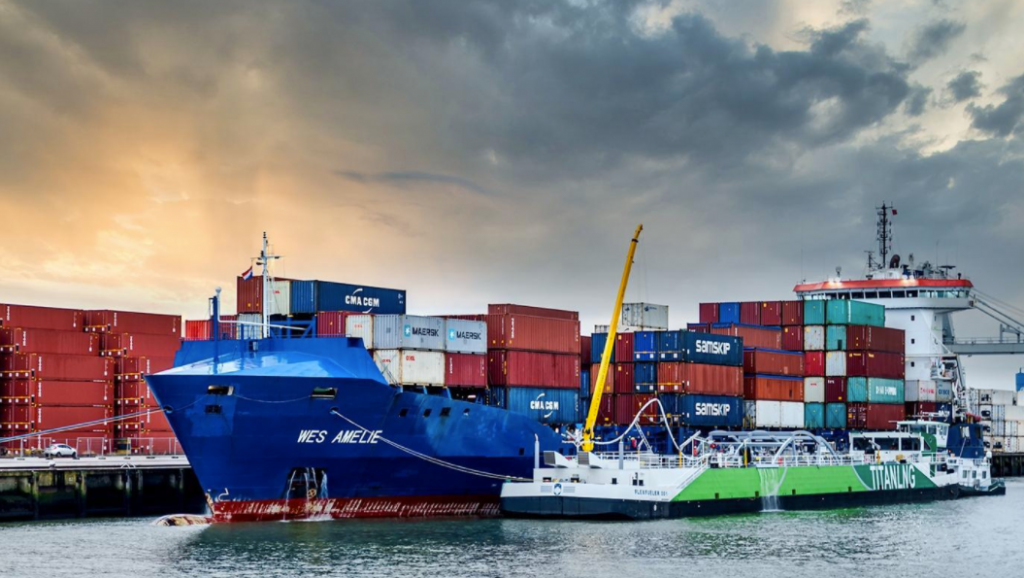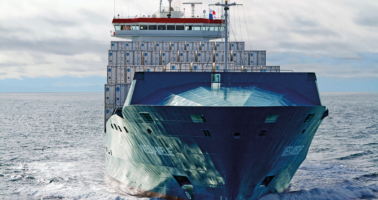The container ship of the Unifeeder company is conducting the first test voyage with liquefied synthetic natural gas (GNS) in the maritime world. The 10.53 gross ton ElbBlue was supplied with this neutral fuel in the German port of Brunsbuttel, near Hamburg, for a trip to Saint Petersburg (Russia), and a second refueling is planned when it returns to Germany before continue towards Rotterdam.
Built in 2010, the vessel, then known as Wes Amelie, was converted to a dual fuel vessel with its engine modified by MAN Energy Solutions. It was the first conversion of a ship of this size and type to run on LNG. On April 21, 2019, the Wes Amelie received the first LNG bunker operation between ships to a ship feeder of containers in the Baltic.
In late 2019, Unifeeder, which operates the 1,036 TEU vessel, announced its plans for the LNG trial. In the meantime, in early 2021, the vessel was sold to Elbdeich Reederei who renamed it ElbBlue. The new owner joined the effort to launch the test project.
With a mix of 20 tons of GNS and 20 tons of conventional LNG, the ElbBlue is expected to save approximately 56 tons of carbon emissions on its next trip to St. Petersburg, as opposed to operating on pure LNG. The ship was fed 20 tons of the new GNS for its 20-hour journey to Russia and back.

"The launch of Unifeeder's GNS trial together with our project partners is an exciting and timely development for our business, as our industry continues to look for ways to reduce carbon output to meet the demands of customers, businesses and environmental policy," said Jesper Kristensen, CEO of Unifeeder. "A successful test voyage will complement our environmental initiatives across Europe, such as our investment in more efficient inland rail and barge services, as well as our continued sustainability ambitions at our terminals across Europe."
The GNS is a demonstration product developed by Kiwi at its energy-to-gas plant near Cloppenburg, Germany. The company uses wind energy to produce green hydrogen. It is then subjected to a methanization process. In 2021, Kiwi also added a new liquefaction plant. The CO2 used in the process is obtained from a nearby biomethane plant. Fuel is supplied to the ship by tanker trucks because an LNG bunkering station has not yet been built in the Elbe estuary.
"This is a crucial step on the path towards the decarbonisation of maritime transport."
"To reduce or even eliminate future emissions generated by the global supply chain, synthetic fuels and engine modernization have a crucial role. While a retrofit instantly reduces a ship's emissions levels, synthetic fuels such as "NGS can allow it to operate in a climate-neutral 100% manner. Today we are demonstrating that any ship retrofitted with LNG can also operate with fuels generated by power-to-X technology, and even as a mixture of fuels depending on availability."
Stefan Eefting, Senior Vice President and Head of MAN PrimeServ, Augsburg
Discussing the project with the German newspaper Handelsblatt, MAN said it was only a demonstration project because the GNS is not yet commercially viable due to cost and limited supplies. According to the newspaper, fuel currently costs three to six times more than LNG conventional due to production in a small test facility. They predicted that economies of scale will make the product competitive when demand grows and large-scale production of GNS begins.

